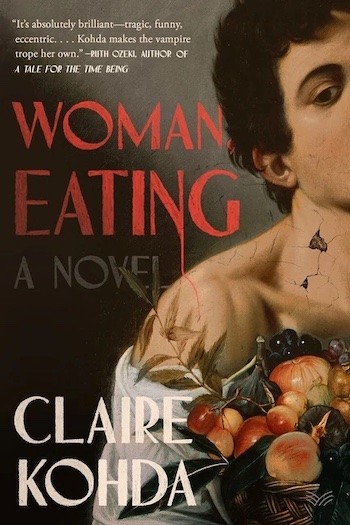Book Review: “Woman, Eating” — A Poignant Bite All Its Own
By Clea Simon
Author Claire Kohda is particularly deft at illustrating how unacknowledged desire will out, undermining our best intentions.
Woman, Eating: A Literary Vampire Novel by Claire Kohda. HarperVia, 240 pp., $26.99

You know a Lydia. We all do — or were one, at one point. A young person, striving to forge a life as an artist, she struggles with what she should do and what she wants. Of course, it may be an appetite, she fears, that could undermine everything she seeks to be.
Food, for example, is a loaded topic for the biracial protagonist/narrator of Claire Kohda’s Woman, Eating. Stuck caring for her stern English mother who has developed dementia — and whom she has just moved into nursing care — Lydia longs for a connection with her late Japanese father, fantasizing about what he ate. “Food means so much in Japan,” she notes. “Soybeans thrown out of temples in February to tempt out demons … soba noodles consumed at New Year help time progress,” she repeats, reciting what she has learned.
At times, her relationship with food seems straightforward. “In the moments of my life when I’ve really resented my mum and wished my dad were alive, I’ve gone to the Asian supermarket in Canterbury,” she recalls. “Now I just associate food in general with my dad.” If only she could indulge herself.
But Lydia has other issues beyond her ability to savor soba. Having just relocated to London to begin an internship at a prestigious gallery, the young artist is lonely and insecure, coming across as believably awkward and — especially now, as we emerge from pandemic isolation — relatably introverted. “Whenever there is something planned in my life — either meeting a friend, going on a school or uni trip, going for a walk, or, like today, starting an internship — when it actually comes to the day I have to go through with the plan, it goes from being something I’m excited about to something I dread.”
Thankfully, Kohda’s young heroine isn’t all puppy-like self-consciousness. She has come to a mature understanding, for example, of the centrality of her art to her life. “The urge I feel is to return to painting … to see if I can find the shape of myself in whatever I create, to try to identify what I am somehow.” This quest goes beyond a conventional identity crisis. For all her apparent normalcy, Lydia is not your usual young person new to the city. Yes, she is a fledgling artist, hoping to make her mark. But her aspirations as well as her angst are complicated by one defining fact: Lydia is a vampire.
Along with other complications, this condition makes friendships problematic. Her mother, who turned Lydia into a vampire like herself when Lydia was a dying — but still mortal — infant, has taught her daughter to let such relationships go. “‘Just imagine she is dead,’” she was told early on. This lesson is painful, but Lydia acknowledges its essential truth. “People — aging and mortal — are like flowers, seasonal, wilting and finite; while I’m like a tree.”
Harder to accept is her mother’s assessment of their shared nature: “We are unnatural, disgusting, and ugly,” Lydia recalls her mother saying. A variation on the body shaming too often passed down from mother to daughter, this message has been internalized by Lydia — until now. At first, Lydia shies away from her nature — and her appetites. But living alone for the first time and mourning the necessity of disconnecting with her childhood best friend, she longs for connection, and she seems to find one with her new neighbor Ben, if not at the chilly and dysfunctional gallery. If only her vampire nature can coexist with their budding romance.

Author Claire Kohda. Photo: RCW Literary Agency
It’s a challenge, but ultimately, her thirst for blood will prove useful in her new life, providing a context for understanding a sexual predator at the gallery. “My mum once told me she believed the origin of our kind was a disease, born of power and colonialism,” she recalls. “That one man took so much that was not his … he stopped being able to nourish his own body with food.” Recognizing her abuser as a different kind of vampire is the simple part, however. Coming to terms with her other hungers — for intimacy as much as sex — is more difficult. Relationships are built on compromise, after all, and Lydia, as we all do, must learn what she can and cannot sacrifice of her essential nature.
In this enjoyable debut novel, Kohda presents Lydia’s thirst for blood as a tidy metaphor for more common cravings. The protagonist’s discomfort with her condition comes across as quite realistic in what is essentially a coming-of-age novel. The author is particularly deft at illustrating how unacknowledged desire will out, undermining our best intentions. Ultimately, not much happens in Woman, Eating, and Lydia’s transformation into a more adult version of herself is telegraphed early on. Still, the conceit works, in part because of the book’s loving detail of the London art scene and a certain type of gallerist/collector. If this short novel suffers from its overreliance on the standard themes of young adulthood, its neat resolution satisfies, with a poignant bite all its own.
Clea Simon’s most recent novel is Hold Me Down (Polis). She can be reached at www.CleaSimon.com.
Tagged: Claire Kohda, Clea Simon, Eating: A Literary Vampire Novel, vampire

[…] with a relatable streak of introversion that keeps her from living the life she longs for (via Arts Fuse). She obtains an internship with an art gallery where she spends her days doing busy work, avoiding […]